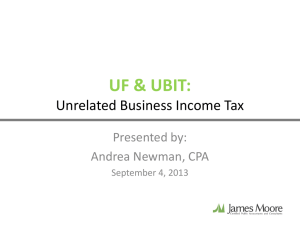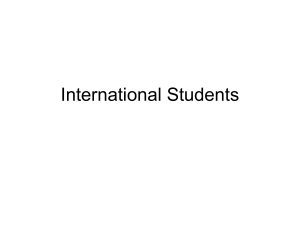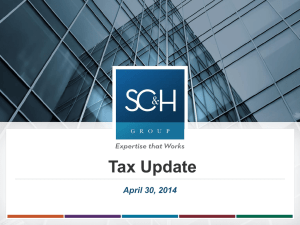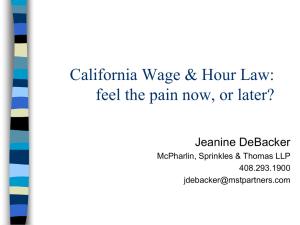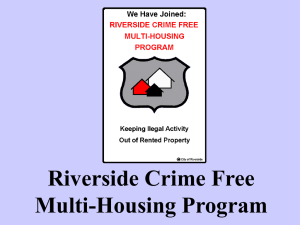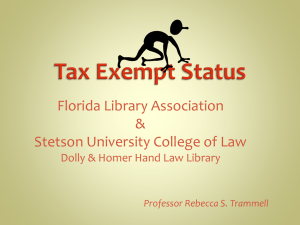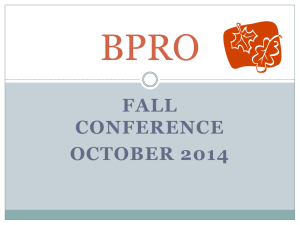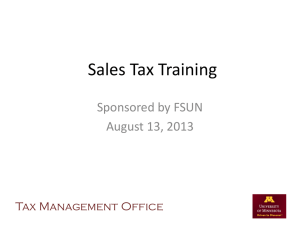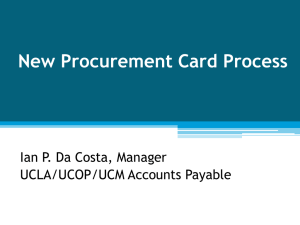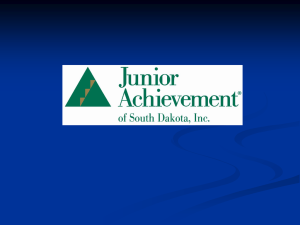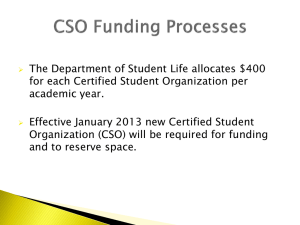UF & UBIT: Unrelated Business Income Tax
advertisement
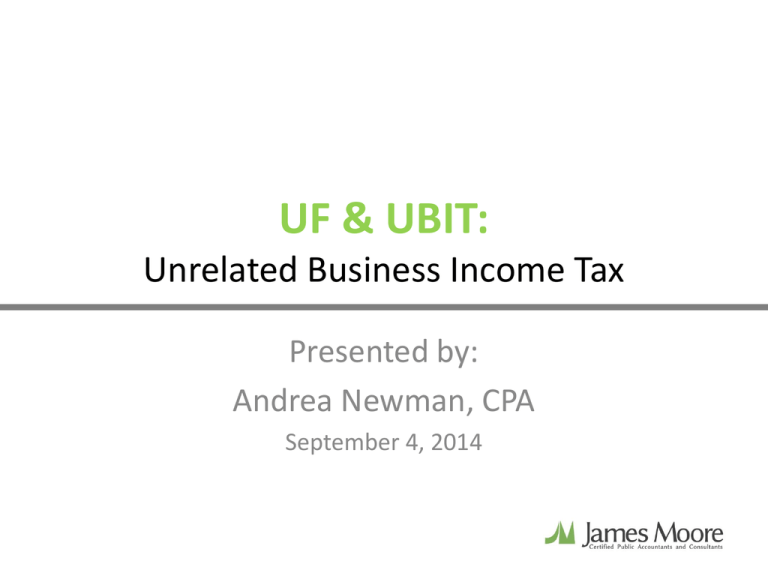
UF & UBIT: Unrelated Business Income Tax Presented by: Andrea Newman, CPA September 4, 2014 • • • • • Background & Basics of UBI UBI Exclusions Potential UBI-Generating Activities Applicable “Real Life” Examples What does the future hold??? What is Unrelated Business Income Tax? UBIT • Under Internal Revenue Code Section 115, the University of Florida is tax-exempt as an instrumentality of the State of Florida – Exempt purposes of state colleges and universities include all of the purposes and functions described in Code Section 501(c)(3) – Federal income tax purposes the University may engage in certain activities UBIT Defined “Income from a trade or business, regularly carried on, that is not substantially related to the charitable, educational or other purpose that is the basis of the organization’s exemption.” The following three criteria must be present: 1. A trade or business 2. Regularly carried on 3. Not substantially related If your activity a trade or business? “Trade or business” – Any activity carried on for the production of income from selling goods or performing services. – If the University/department is selling goods or services to generate income, even if it is conducting the activity within the larger group of activities related to its exempt purpose, the activity is a trade or business. – While the University/department is carrying on its daily exempt function, it could also be carrying on activities that are taxable. - Important Factor To Consider Whether A Profit Motive Exists Is your activity carried on? • Regularly carried on – If activities show a frequency and continuity, and are pursued in a manner similar to comparable commercial activities of nonexempt organizations. Key: The frequency in which for-profit operates. • If an activity is a type that a for-profit entity would conduct on a year-round basis, the same activity by an exempt entity will not be “regularly carried on” if it is for a few weeks. Is your activity not substantially related? • Related to University Exempt Purpose – To be related to the University’s educational or research exempt purpose, there must a substantial causal relationship. – The activity must contribute importantly to the accomplishment of the exempt purpose (other than the University’s need to produce income). • Size & Extent – Particular emphasis is placed on the size and extent of the activity. – If an activity is conducted on a scale larger than reasonably necessary to carry out the exempt purpose, it is more likely to be treated as unrelated. • Dual Use of Assets & Facilities – Use for both exempt and commercial purposes will not necessarily exempt the income derived from commercial use unless the business activity “contributes importantly” to the accomplishment of exempt purposes. Substantially Related Income • Factual Question: Is there a relationship between activity and accomplishment of UF’s exempt purpose? – Direct relation to the University’s exempt purpose. • IRS compares incorporation documents and operations • New activities should be reviewed to ensure consistency with exempt purpose • Just because an activity raises needed funds for the University/department does not mean that the activity is exempt Substantially Related Income • Substantially Related: Depends on facts & circumstances of each case – Factors that the IRS and courts have relied on in concluding that an activity is not substantially related: • Fees charged to the general public are comparable to commercial facilities; • Only those that purchase the goods or services are benefited and the benefits are in direct proportion to the fees charged; • The organization furnishes and operates the facilities through its own employees who perform substantial services in providing the activity; and • Maximization of profit is a predominant element in the exempt organization’s conduct of the activity. • • • • • Background & Basics of UBI UBI Exclusions Potential UBI-Generating Activities Applicable “Real Life” Examples What does the future hold??? Exclusions From UBIT • Volunteer Labor – Activities in which substantially all (85% or more) work is performed by volunteers • Convenience of University Members – Activities operated for the convenience of members, students, patients, or employees • Donated Merchandise – Sales of merchandise that is substantially all (85% or more) donated to the University Excluded From Taxable Income • • • • • Dividends Interest Annuities Royalties Rental income from real property • Income from certain forms of research Royalties Tax, duty or compensation paid to owners of a patent, copyright, mineral interest, or other property right for the use of it or the right to exploit it • Royalty exclusion includes: – Overriding royalties – Net profits royalties – Royalty income received from licenses by the University as the legal and beneficial owner of patents assigned to it • Exception: Royalty income derived in part from the performance of services – payment will not constitute royalty income Rents • Rules vary depending on whether they are derived from real or personal property or from a mixed lease of both real and personal property • Real Property – Generally, rents from real property are excluded: – Property is not debt financed – Additional services are not rendered – Are not dependent on percentage of profits Rents • Rental of real estate is generally not taxable • The following may be taxable: – Rental based on income or profits of lessee is taxable – Services other than customary rental may taint rental – Portion for personal property rental is generally taxable – Parking rental is generally taxable – Hotel income is generally taxable – Debt-financed rental is generally taxable • Special rules that apply to Universities, i.e. “qualified organizations” Rents • Personal Property – Generally, rents from personal property are excluded only if there is a mixed lease and the rents attributable to the personal property are an “incidental” part of the total rents received under the lease • Rental of personal property is generally taxable – Ignored as incidental if value is 10% or less – Separated, if between 10% and 49% – If 50% or more – then it’s all taxable Rents • Services provided with the rental – Other than customary landlord/tenant maintenance – For benefit of the tenant – May render entire rental as taxable • Examples: – Supplying of maid or linen services services – Furnishing of heat and light not services – Cleaning of public entrances, exits, stairways, or lobbies not services – Collection of trash not services – Renting of parking spaces where attendant is on duty services – Providing security services to a parking garage services • • • • • Background & Basics of UBI UBI Exclusions Potential UBI-Generating Activities Applicable “Real Life” Examples What does the future hold??? Potential UBI-Generating Activities • • • • Advertising Contract research Sales of Merchandise Licensing Agreements / Affinity Income Advertising • Any language which is an inducement to purchase a product or service • Qualitative or comparative language • Price information • Indication of savings • Endorsements • Call to action Examples of Activities Which May Generate Advertising Income • Sports programs • Scoreboards • Sponsorships of a departmental newsletter • Student newspaper • Periodical advertising • Web-site advertising • TV & radio broadcasting rights Contract research may constitute unrelated business income Related to exempt purposes – How to tell • Is the project scientific? – Must be yes • Is the project research? – Must be yes • Is the project in the public interest? – Must be yes Excluded from unrelated business income • Conducted for federal or state governments • Conducted for colleges and hospitals • Fundamental research available to the public The regulations are complex and require a contract by contract analysis. Sales of Merchandise • In general, sales of merchandise is separated into three major categories: 1. 2. 3. Directly educational materials – nontaxable Non-educational, convenience exception – nontaxable Other merchandise sales – taxable • Exempt Sales: – IRS College and University Audit Examination Guidelines • Items that are “required or otherwise necessary” for participation in a course of instruction and other educational materials that “further the unstructured intellectual life of the campus community” • Non-educational items that are low in cost and in recurrent demand may fall under the convenience exception Sales of Merchandise • Taxable Sales – IRS holds that the “convenience exception” does not apply to items with a useful life of more than one year • Exception: Logo novelty item or logo clothing – Sales to the general public do not fall within the “convenience exception” Sale of Merchandise Unrelated, excluded or related revenue? Unrelated Examples: • University book store items sold to Alumni • University cafeteria providing catering services to other businesses • Hospital’s pharmacy sales to nonpatients, non-employees Excluded Examples: Related Examples: • Non-Education items from a University’s book store sold to students at a university (convenience) • Educational materials from a University’s book store sold to students at a university • University catering to university departmental meetings (convenience) • University catering to students, faculty, and staff (similar to excluded since for convenience) • Hospital’s pharmacy sales to employees (convenience) • Hospital pharmacy sale to patients • Sales where volunteer labor is a material factor (volunteer) • Sale of merchandise that was donated Licensing Agreements /Affinity Income • Royalty exclusion is commonly used by exempt organizations to exclude licensing fees from UBIT. • IRS generally agrees so long as the exempt organization plays a passive role in the licensing agreement. – Active Involvement – The IRS views the royalty payment as consideration for services performed and not a royalty. Licensing Agreements /Affinity Income: Rough Set of Guidelines • Avoid providing specific services (i.e. advertising, promotion, endorsements, etc.) – Ok to review materials for quality control – Agreement should expressly state that the organization will not provide specific services • Only services should be “de minimis” or “courtesy” services • Arrangements necessitating substantial services – Create a separate agreement for the service component and allocate a portion of the income to services • Specifically terming the arrangement a “licensing agreement” and referring to the payments as “royalties” – Avoids certain amount of discrepancy • • • • • Background & Basics of UBI UBI Exclusions Potential UBI-Generating Activities Applicable “Real Life” Examples What does the future hold??? Advertising v. Bookstore Advertising Bookstore Exempt Reportable Exempt Reportable Sale of commercial advertising and underwriting time on a campus radio station. Students assist in subscription drives and underwriting and advertising sales programs. Sale of commercial advertising space in campus newspapers, journals, magazines, or other periodicals Sale of advertising space in souvenir programs for sports events (or music or drama performances). Sale of commercial advertising in sports media guides. Sales are made by a full-time person throughout the year. Sale of books, athletic clothing, general school supplies, computer hardware and software, and items that are low in cost and in recurrent demand to University members. Sale of books, athletic clothing, general school supplies, computer hardware and software, and items that are low in cost and in recurrent demand to the general public. Sales of computers to students or faculty members. Sales of computers at a discount to other educational institutions. Career Services v. Debt-financed Property Career Services Exempt Debt-financed Property Reportable Exempt Career services, such as resume critiquing, interview coordination, and other job placement assistance provided to alumni for a fee. Rental of apartments to students and non-University members. The apartment building is subject to a mortgage (**special rule pertaining to University’s) Reportable Equipment Rentals v. Equipment Sales Equipment Rentals Equipment Sales Exempt Reportable Exempt Reportable Rental of equipment (e.g., outdoor recreation equipment, scientific instruments, etc.) to non-University members. Sale of obsolete equipment to the general public. Sale of electronic equipment to non-University members. Facilities Usage v. Hotel & Restaurant Operations Facilities Usage (No Lease) Hotel & Restaurant Operations Exempt Reportable Exempt Reportable Rental of facilities to nonUniversity members for conferences and symposiums. Use of University-owned golf course by alumni, spouse and guests of students, faculty and staff. Sales to students’ , student’s families and friends, prospective students and their families, participants in school functions and activities, and persons having business with the school. Sales to tourists, spectators at sporting events (including alumni), and the general public. Use of recreational facilities for classes offered to the general public and alumni. Entertainment Events v. Rents Entertainment Events Rents (Lease Basis) Exempt Reportable Exempt Reportable Events conducted in which the school’s own students put on the event (i.e., a play, concert recital, or ballet). Events involving professional entertainers (i.e. a professional performance involving paid entertainers). Rental of campus building or space within a building. Includes leasing for a fixed periodic fee or a fee that is a percentage of gross income. Leasing of property for a fee that is based on a percent of net income or profit. Rental of athletic facilities and equipment to nonUniversity members. Revenue is derived from rental of real property (95%) and personal property (5%). Parking Facilities v. Sales Parking Facilities Sales Exempt Exempt Reportable Sale of clothing and other items to the University community that are embossed with the University seal. Sale of emblematic items (Tshirts, mugs, caps, pennants, etc.) to alumni and the general public. The sales are made by mail order on a regular basis. Reportable Income from University owned Operation of a parking facility parking facilities used by that is used by members of the faculty, staff, and employees. general public. University enters into a lease with a third party who operates the University’s parking facility and pays fixed rent to the University. Sale of excess crops used in research. The crops are sold in an “as is” condition when mature. Tower Rentals v. Catering/Food Services Tower Rentals Catering/Food Services Exempt Reportable Exempt Reportable Rental of space on campus building or freestanding tower to a third-party for placement of cellular transmission equipment, i.e. University allows third party to place its tower on University real estate, (either ground or existing building). Rental of antenna space on a tower owned by the University (permanently affixed to either the ground or an existing building). Rental of several rooms and halls on campus to unrelated organization for meetings where a contracted outside company provides food and drink to these organizations at these meetings and events. Rental of various rooms and halls on campus to unrelated groups for meetings where the University’s food services division provides catering services for these meetings. *Income from both catering services and rental of facilities (substantial services provided) Payments for the use of excess radio frequency. • • • • • Background & Basics of UBI UBI Exclusions Potential UBI-Generating Activities Applicable “Real Life” Examples What does the future hold??? Discussion Draft of “Tax Reform ACT of 2014” • Draft includes a number of proposed UBIT changes: – Income from the sale of goods from mail order and catalog sales of book stores would be treated as UBIT subject to certain exceptions that included sales of mementoes, T-shirts, and other items with the exempt organization’s logo costing less than $15.00. – Special exemptions for sales of goods to students with a retail price of $15.00 or less, and for items with higher prices if the sales furthered educational programs and the articles were not common consumer goods. • Books and computer software would be exempted but not appliances, cameras, television sets, VCRs, and recreational sports equipment. • Exemptions for computer sales would be granted on the condition that the faculty member approved the purchase. – Health, fitness, exercise, and similar health promotion activities for a special fee would be subjected to UBIT. – Income derived by a college or university from travel or tours conducted by the students and faculty would be subject to UBIT except where travel is related to a degree program curriculum. Discussion Draft of “Tax Reform ACT of 2014” – Income derived from food sale by a university for students, faculty, or employees would be subject to UBIT unless provided on the institution’s premises. – Lodging facilities income would be treated as UBIT except in the case of college or universities only when such facilities are used as dormitories, or fraternity, or sorority housing used by students, faculty, or staff but not to facilities patronized by the public. – Affinity credit card income or catalog and endorsement activities would be treated as UBTI. • A number of these items were included in the college and university questionnaire issued by the IRS. – Advertising income subject to UBIT could only be reduced by deductions associated with direct advertising costs. • The Draft Report also recommended that the convenience exception to UBTI under the IRS Code should be repealed except for limited exceptions applicable to university dining halls and dorms. Questions Andrea Newman, CPA James Moore, CPAs Email: Andrea.Newman@jmco.com Phone: (352) 378-1331
